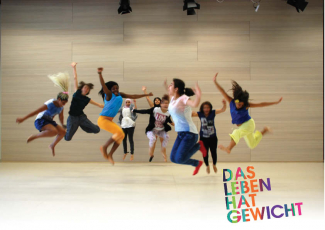
A project on health and nutrition in the context of migration and social tensions.
Target Group
The primary target group is migrant youth. The project also addresses parents and families of young migrants as well as individuals working in the fields of education, social work and health.
Background
In recent years, we have noticed an increasing demand for support, information and reflections on the issue of eating disorders, body images, consumer behaviour and nutrition in several projects and fields of work in maiz. Also, several academic investigations have claimed an interaction between migration, discrimination and illnesses associated with food and nutrition (Hölling & Schlack 2007; IFF 2007; Kräling et al. 2010; RKI 2008). Sociocultural factors play an important role in these kind of illnesses. Nevertheless, there are, as far as we know, no participative projects for research and prevention, specifically for young migrants, on this issue. We want to fill this gap with this project.
Transdisciplinarity and Participation
The approach of maiz is characterized by consideration of health-related, social and economic factors in its interaction and by using different methods. Moreover, maiz considers it important for young migrants to be able toplay an active role in the project. We want to create a space for reflection and discussion on nutrition, health, consumption and aesthetics, for developing new perspectives and exploring new ways of action. By taking into account the experiences and perspectives of young migrants, an understanding of the interaction between different factors that influence their health in terms of food and body-image can be achieved.
Artistic Strategy
The participants of the project will have the opportunity to deal with the issue of nutrition, health, consumption and aesthetic in an artistic way. A critical artistic approach to the issue offers participants the possibility to distance themselves from societal conventions and conditions, to think about them differently and to develop and show wishes and utopias.
Prevention
As a prevention project, the focus is on health and empowerment of young migrants. Their families and parents as well as individuals working in social, educational and health-related institutions will also be involved. We want to establish a project that supports its participants to become aware of the factors that are relevant to them in the context of health, nutrition and society and to find strategies to deal with that. Based on the insights and using the products that will be createdthroughout the project, we will develop materials to present in public and to train disseminators. For this purpose, maiz has established cooperation with different partners from the fields of health, science, migration and art.
Contact
daslebenhatgewicht@maiz.at
Cooperation and Partnerships
Akademie der bildenden Künste Wien
dorf tv
FIFTITU%
Frauengesundheitszentrum Linz
Institut Suchtprävention, pro mente Oberösterreich
Johannes Kepler Universität Linz: Institut für Frauen- und Geschlechterforschung
Kunstuniversität Linz: Zeitbasierte Medien
Landes Frauen- und Kinderklinik, Abteilung für Kinder- und Jugendpsychiatrie
Neue Musikmittelschule Traun
Pangea. Werkstatt der Kulturen der Welt
Radio FRO
Selbstorganisation Muslimischer Migrantinnen (SOMM), Graz
Stadträtin für Frauen, Umwelt, Naturschutz und Bildung, Linz
trafo.k (Projektevaluation)


![]()
Literature
Hölling, H., Schlack, R. 2007: Essstörungen im Kindes und Jugendalter. Erste Ergebnisse aus dem Kinder- und Jugendgesundheitssurvey (KiGGS). Bundesgesundheitsblatt, Gesundheitsforschung, Gesundheitsschutz 5/6, 794–799.
Interdisziplinäres Zentrum für Frauen- und Geschlechterforschung (IFF) 2007: Gesundheit-Gewalt-Migration. Universität Bielefeld, im Auftrag des Bundesministeriums für Familie, Senioren, Frauen und Jugend.
Kräling, S., Losekam, S., Götzky, B., Rief, W., & Hilbert, A. 2010: Der Einfluss gewichtsbezogener Diskriminierung auf Essstörungs- und allgemeine Psychopathologie bei Kindern und Jugendlichen mit und ohne Migrationshintergrund. Psychotherapie, Psychosomatik, Medizinische Psychologie 60(9-10), 397–401.
Robert Koch Institut (RKI) 2008: Beiträge zur Gesundheitsberichterstattung des Bundes. Kinder- und Jugendgesundheitssurvey (KiGGS) 2003–2006: Kinder und Jugendliche mit Migrationshintergrund in Deutschland




